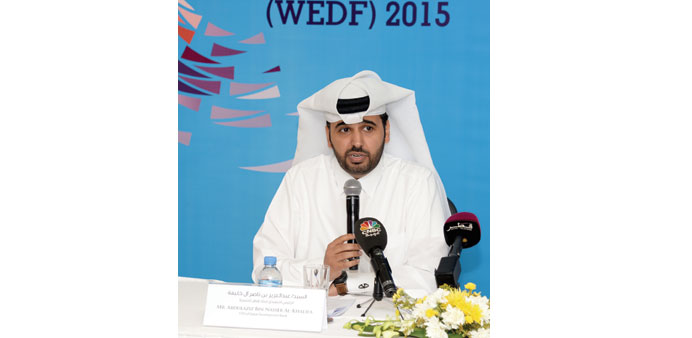QDB and International Trade Centre (ITC) have reached a memorandum of understanding to maximise the competitiveness of Qatari SMEs, according to QDB chief executive Abdulaziz bin Nasser al-Khalifa. PICTURE: Thajudheen
Small and medium-sized enterprises (SMEs) have signed deals worth QR300mn, nearly half of the amount coming from Qatari companies during the 2015 World Export Development Forum held recently in Doha, said Qatar Development Bank CEO Abdulaziz bin Nasser al-Khalifa.
Al-Khalifa said: “We are really proud, that SMEs managed to achieve many tentative deals worth QR300mn. The share of Qatari SMEs was nearly 50%, an estimated value of QR150mn.
“This clearly reflects the ability of Qatari SMEs to compete both domestically and internationally, and that we are on the right track in supporting and assisting them in reaching new markets, and proving the quality of Qatari products.”
Held in the Middle East for the first time, al-Khalifa said the 2015 WEDF represents the “strategic importance of Qatar as a commercial bridge between continents.”
“The 2015 WEDF has showcased the support we provide to the SME sector, in line with the Qatar National Vision 2030,” al-Khalifa pointed out.
Al-Khalifa said QDB and International Trade Centre (ITC) executive director Arancha González also signed a memorandum of understanding for the development of a “Strategic Trade Development Roadmap” to maximise the competitiveness of Qatari SMEs.
The two-day forum, organised under the supervision of the Ministry of Finance and ITC, witnessed the announcement of 90 letters of intent across a variety of sectors. Pledges were made among the food and beverages, plastics, and services and tourism sectors.
More than 700 people from 92 countries, including 26 least developed countries, attended the event. Five trade promotion organisations from Bangladesh, Egypt, Georgia, Nigeria and Vietnam, signed an agreement to support trade development between them.
The forum consisted of four plenary sessions and four parallel breakout sessions. In addition, structured and informal B2B meetings allowed participating SMEs to meet potential customers, suppliers, and investors.
The speakers also addressed the unique challenges and opportunities faced by SMEs in developing countries and economies in transition. They explored how these businesses could be empowered to use international trade and investment to drive growth and job creation.

